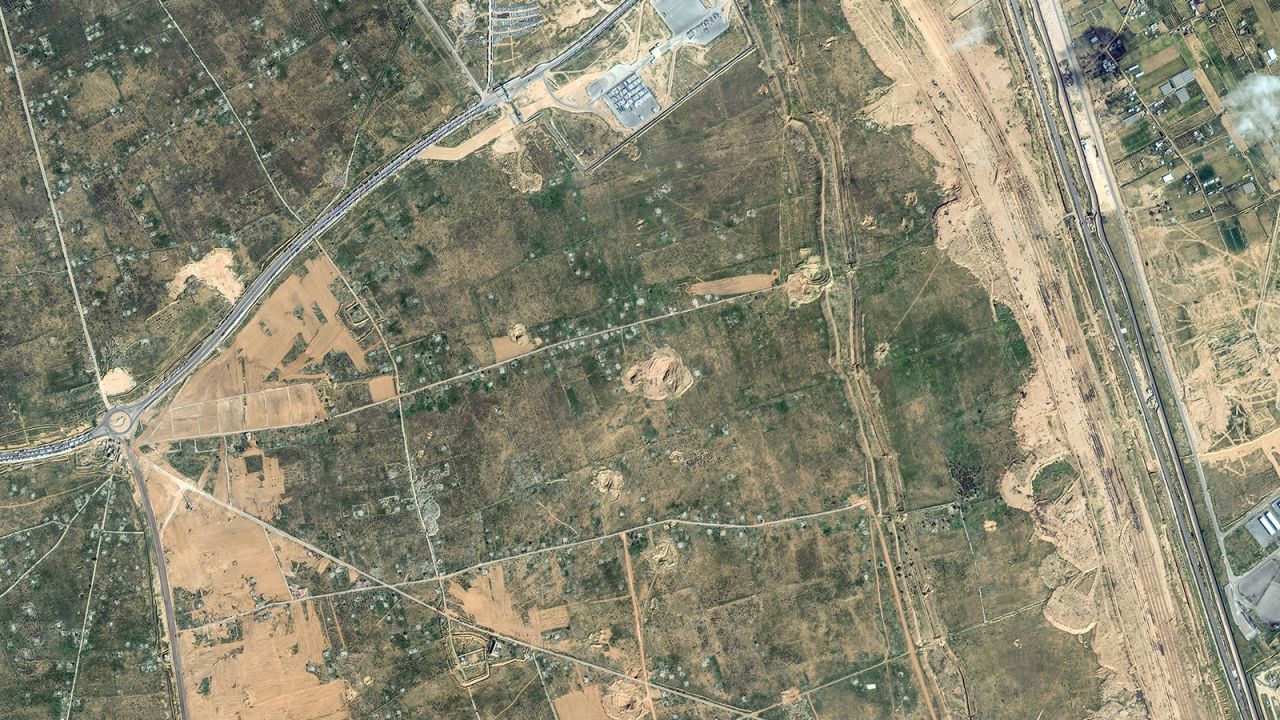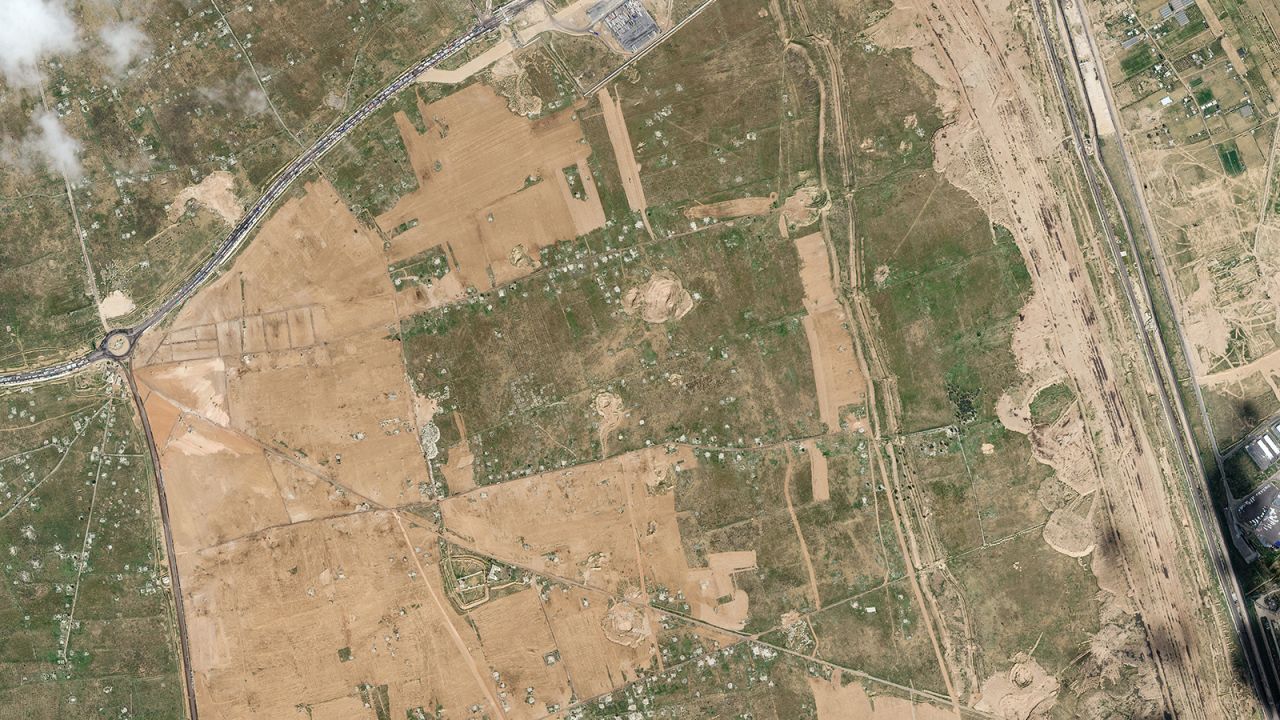CNN
—
Egypt is building a wide-ranging buffer zone and wall along its border with the southern Gaza Strip, new satellite images show, as concerns grow about a planned Israeli ground offensive in Rafah where more than half of Gaza's population is taking shelter.
Images taken by Maxar Technologies in the past five days show that a large portion of Egyptian land between the road and the Gaza border has been bulldozed.
If completed, the buffer zone – which extends from the end of the Gaza border to the Mediterranean Sea – will swallow the entire Rafah border crossing complex between Egypt and Rafah.
At the actual border, several cranes can be seen placing parts of the wall.
Additional satellite images reviewed by CNN show that bulldozers arrived at the site on February 3, and initial excavations in the buffer zone began on February 6.
There has been a significant spike in excavation work in the past five days.
Videos published by the Sinai Foundation for Human Rights show the construction of the border wall, which it claims is five meters (16 feet) high.
The organization, a human rights non-governmental organization made up of activists, researchers and journalists, said that two local contractors informed them that the Egyptian Armed Forces carried out the mission.
CNN contacted the Egyptian government to comment on the buffer zone and the construction of the wall.
This construction comes as fears grow that the already horrific humanitarian situation in Gaza will worsen, causing thousands of deaths and a mass exodus of Palestinians to the Egyptian border.
All eyes are on Rafah, located along the new buffer zone, where nearly 1.5 million Palestinians live crammed into a massive tent city.
Despite international pressure, Israeli Prime Minister Benjamin Netanyahu reiterated his plans to launch a military ground attack on the southern Gaza City, saying it was Hamas' “last stronghold.”
IDF spokesman Lt. Col. Peter Lerner told CNN earlier this week that the army aims to develop a plan to evacuate civilians “out of harm’s way” and distinguish civilians from Hamas fighters. However, it has not yet submitted the evacuation plan to the government, he told CNN on Tuesday.
The city is the last remaining refuge in Gaza for displaced Palestinians, and panic is mounting as many decide whether to stay or leave ahead of the planned ground offensive. Families suffering from a lack of food, water and medicine live in tents a few meters away from the barbed wire fence that separates them from Egypt. Most of them went to Rafah after being displaced by the war elsewhere in Gaza.
Raja Musleh, the Gaza representative of the non-profit organization MedGlobal, currently based in Rafah, painted a vivid picture of the situation in the besieged town, saying that the health workers still alive “may still be breathing, but we are dying inside.”
“The situation we are living in in Rafah is horrific and getting worse every day. We have no water to drink or food to eat, and our healthcare facilities are barely able to function,” Musleh said.
A growing number of countries and international organizations have called on Israel to avoid a ground operation in what is now Gaza's most populous city, with Fabrizio Carbone, regional director of the International Committee of the Red Cross, saying “countless lives hang in the balance.” The leaders of Australia, Canada and New Zealand warned on Thursday that such an incursion “would be catastrophic.”
Egypt has already denounced the Israeli move to push the Palestinians south into the Strip, indicating that this is part of a plan to expel the residents of Gaza and that it will mean the end of the Palestinian issue. Egypt has now sounded the alarm once again as Israel prepares for its military operation in Rafah.
Egypt has begun strengthening its security presence on its border with Gaza as a “precautionary” measure ahead of the expected Israeli ground operation, Egyptian security officials told CNN. The officials said that as part of its security enhancement, Egypt deployed more forces and vehicles in North Sinai on the border with Gaza.
A witness told CNN that checkpoints leading to the Rafah border crossing on the Egyptian side have also been fortified with more soldiers, and areas around the main road are being prepared for the deployment of tanks and military vehicles.
This comes as Netanyahu continues to attack Egypt for not closing the Philadelphia Corridor – the strip of land between Egypt and Gaza and the only border not controlled by Israel in the besieged Strip. In a press conference on January 13, Netanyahu said that Israel would not consider the war over until it was closed.
Israel has been accused of building its own buffer zone, but inside Gaza, which would effectively shrink the Strip's borders. UN High Commissioner for Human Rights Volker Türk said in a February 8 statement that the Israeli military was destroying Gaza buildings “located within one kilometer of the Israel-Gaza fence, and clearing the area with the aim of creating a ‘buffer zone’.”
Türk went on to say, “Israel did not provide convincing reasons for such widespread destruction of civilian infrastructure.”




/cdn.vox-cdn.com/uploads/chorus_asset/file/25550621/voultar_snes2.jpg)



More Stories
Two children killed, 11 injured in stabbing attack at Taylor Swift dance party in UK, 17-year-old arrested
Fiber optic communications networks are being sabotaged – DW – 07/29/2024
Putin warns US against deploying long-range missiles in Germany | NATO